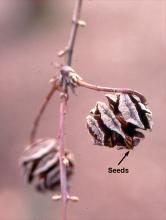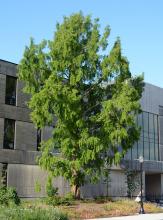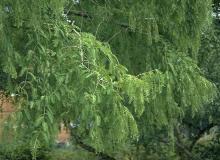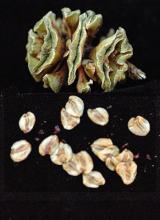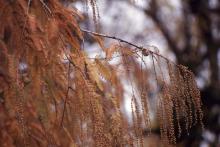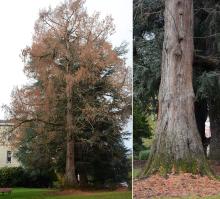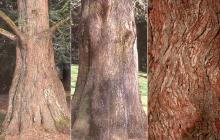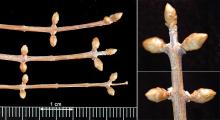Metasequoia glyptostroboides
Common name:
Dawn Redwood
Pronunciation:
met-a-se-KWOY-a glip-to-stro-BOY-dez
Family:
Cupressaceae
Genus:
Type:
Conifer
Native to (or naturalized in) Oregon:
No
- Deciduous conifer, 70-100 ft (21-30 m), excurrent, pyramidal, flat topped when mature. Needles are arranged in opposite pairs, each is about 15 mm long, straight or slightly curved, bright green above, light green below. Bark reddish brown when young, darker, fissuring, and exfoliating in strips when mature. The trees are monoecious, both male and female cones on an individual plant. The female (seed) cones are solitary, oval, green then light brown, about 2 cm long; male (pollen) cones are arranged in long pendant clusters, each cone is globose and about 5 mm long. Pollination occurs in early spring and the seeds in the female cones are mature by the fall. (However, because of western Oregon's wet, but mild, winters, the cones are not dry enough to open and release the seeds until the following spring.)
- Sun. Easy to transplant, performs best in moist, well-drained, slightly acid soils.
-
Hardy to USDA Zone 4 Native to Sichuan (Szechuan, Szechwan), China. Only introduced in 1948. Several cultivars are available, including:
- 'Gold Rush' - bright yellow foliage in spring and retains much of the color throughout the summer
- 'Miss Grace' - more or less ground sprawling, but if staked, a small tree with weeping branches
- State Fossil of Oregon: The Oregon legislature designated the Metasequoia as the official state fossil in 2005. Metasequoia flourished in the Miocene epoch of 25 to 5 million years ago and left its record embedded in rocks across the Oregon landscape.
- Corvallis: tree in Riverfront Park, just south of the Harrison Ave. bridge.
- Oregon State Univ. campus: 1. Northeast of Community Hall (planted 1948); 2. Front of and on the east side of the Peavy Forest Science Center, Jefferson Way and 30th Street
- History of Dawn Redwood trees at Oregon State University
Click image to enlarge




